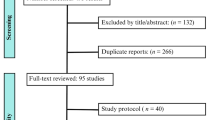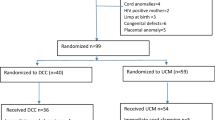Abstract
We sought to investigate obstetric outcomes and acceptance rates for blood products or types of autotransfusion by Jehovah’s Witnesses (JWs) at a single institution in Japan. We retrospectively reviewed cases of 84 pregnant JW patients and 95 deliveries from April 2001 to August 2017. We examined the acceptance rates of blood transfusions, blood products, and autotransfusion types in patients who experienced postpartum hemorrhage (PPH), and investigated estimated hemorrhage volume at delivery and PPH treatments. Of the 84 JW patients, none accepted blood transfusion; however, 75 patients (89.3%) accepted blood products, 57 (67.9%) accepted autotransfusion using intraoperative cell salvage, and four (4.8%) refused all alternatives to blood transfusion. Furthermore, PPH > 1000 mL occurred in 18 of the 95 (18.9%) deliveries. Of these 18 patients, four (22.2%) required blood products and three (16.7%) required supracervical hysterectomy to control PPH. No maternal deaths occurred. Approximately 95% of the patients observed accepted all or some alternatives to blood transfusion. To treat JW patients in a safer manner, understanding their individual acceptance of alternatives to blood transfusion is important for the strategic use of such alternatives.
Similar content being viewed by others
References
Zeybek B, Childress AM, Kilic GS, Phelps JY, Pacheco LD, Carter MA, et al. Management of the Jehovah’s Witness in obstetrics and gynecology: a comprehensive medical, ethical, and legal approach. Obstet Gynecol Surv. 2016;7:488–500.
jw. http://www.jw.org/ja/. Accessed 17 Aug 2017
Kobayashi T, Nakabayashi M, Yoshioka A, Maeda M, Ikenoue T. Recombinant activated factor VII (rFVIIa/NovoSeven(R)) in the management of severe postpartum haemorrhage: initial report of a multicentre case series in Japan. Int J Hematol. 2012;95:57–63.
Suzuki Y, Matsuzaki S, Mimura K, Kumasawa K, Tomimatsu T, Endo M, et al. Investigation of perioperative complications associated with use of uterine compression sutures. Int J Gynaecol Obstet. 2017;139:28–33.
American College of O, Gynecologists. ACOG practice bulletin: clinical management guidelines for obstetrician-gynecologists number 76, October 2006: postpartum hemorrhage. Obstet Gynecol. 2006;108:1039–47.
Maswime S, Buchmann E. A systematic review of maternal near miss and mortality due to postpartum hemorrhage. Int J Gynaecol Obstet. 2017;137:1–7.
Singla AK, Lapinski RH, Berkowitz RL, Saphier CJ. Are women who are Jehovah’s Witnesses at risk of maternal death? Am J Obstet Gynecol. 2001;185:893–5.
Massiah N, Athimulam S, Loo C, Okolo S, Yoong W. Obstetric care of Jehovah’s Witnesses: a 14-year observational study. Arch Gynecol Obstet. 2007;276:339–43.
Van Wolfswinkel ME, Zwart JJ, Schutte JM, Duvekot JJ, Pel M, Van Roosmalen J. Maternal mortality and serious maternal morbidity in Jehovah’s witnesses in The Netherlands. BJOG. 2009;116:1103–8 (discussion 8–10).
Muramoto O. Bioethical aspects of the recent changes in the policy of refusal of blood by Jehovah’s witnesses. BMJ. 2001;322(7277):37–9.
Gyamfi C, Berkowitz RL. Responses by pregnant Jehovah’s Witnesses on health care proxies. Obstet Gynecol. 2004;104:541–4.
Hubbard R, Waters JH, Yazer MH. Heterogeneity in blood product acceptance among antenatal patients of the Jehovah’s Witness faith. Obstet Gynecol. 2015;126:974–7.
Husarova V, Donnelly G, Doolan A, Garstka M, Ni Ainle F, McCaul C. Preferences of Jehovah’s Witnesses regarding haematological supports in an obstetric setting: experience of a single university teaching hospital. Int J Obstet Anesth. 2016;25:53–7.
Mavromatidis G, Dinas K, Delkos D, Goutzioulis F, Vosnakis C, Hatzipantelis E, et al. Uneventful cesarean delivery with administration of factor XI concentrate in a patient with severe factor XI deficiency. Int J Hematol. 2007;86:222–4.
Gyamfi C, Berkowitz RL. Management of pregnancy in a Jehovah’s Witness. Obstet Gynecol Clin North Am. 2007;34:357–65, ix.
Franchini M. Recombinant factor VIIa: a review on its clinical use. Int J Hematol. 2006;83:126–38.
Shirahata A, Kamiya T, Takamatsu J, Kojima T, Fukutake K, Arai M, et al. Clinical trial to investigate the pharmacokinetics, pharmacodynamics, safety, and efficacy of recombinant factor VIIa in Japanese patients with hemophilia with inhibitors. Int J Hematol. 2001;73:517–25.
de Souza A, Permezel M, Anderson M, Ross A, McMillan J, Walker S. Antenatal erythropoietin and intra-operative cell salvage in a Jehovah’s Witness with placenta praevia. BJOG. 2003;110:524–6.
Kalu E, Wayne C, Croucher C, Findley I, Manyonda I. Triplet pregnancy in a Jehovah’s witness: recombinant human erythropoietin and iron supplementation for minimising the risks of excessive blood loss. BJOG. 2002;109:723–5.
Nagy CJ, Wheeler AS, Archer TL. Acute normovolemic hemodilution, intraoperative cell salvage and PulseCO hemodynamic monitoring in a Jehovah’s Witness with placenta percreta. Int J Obstet Anesth. 2008;17:159–63.
Belaouchi M, Romero E, Mazzinari G, Esparza M, Garcia-Cebrian C, Gil F, et al. Management of massive bleeding in a Jehovah’s Witness obstetric patient: the overwhelming importance of a pre-established multidisciplinary protocol. Blood Transfus. 2016;14:541–4.
Yee LM, Sandoval G, Bailit J, Reddy UM, Wapner RJ, Varner MW, et al. Maternal and neonatal outcomes with early compared with delayed pushing among nulliparous women. Obstet Gynecol. 2016;128:1039–47.
Prevention and Management of Postpartum Haemorrhage. Green-top guideline no 52. BJOG. 2017;124:e106–49.
Morikawa M, Kuramoto A, Nakayama M, Oguchi H, Hasegawa M, Funakoshi T, et al. Intraoperative red cell salvage during obstetric surgery in 50 Japanese women. Int J Gynaecol Obstet. 2015;128:256–9.
Liumbruno GM, Meschini A, Liumbruno C, Rafanelli D. The introduction of intra-operative cell salvage in obstetric clinical practice: a review of the available evidence. Eur J Obstet Gynecol Reprod Biol. 2011;159:19–25.
Committee on Obstetric P. ACOG committee opinion. Placenta accreta. Number 266, January 2002. American College of Obstetricians and Gynecologists. Int J Gynaecol Obstet. 2002;77:77–8.
Committee on Practice B-O. Practice bulletin no. 183: postpartum hemorrhage. Obstet Gynecol. 2017;130:e168–86.
Acknowledgements
The authors thank H. Abe and K. Sakiyama for their administrative assistance in preparing this manuscript.
Funding
There is no source of financial support or funding.
Author information
Authors and Affiliations
Contributions
MT, SM, and EM made substantial contributions to the conception and design of this manuscript, collected the clinical data, and drafted as well as revised the manuscript. KM, TTu, TTa, and TK helped in drafting the manuscript and responded to the submission requirements. TK conceived and generally supervised this study, and gave final approval for the publication of this manuscript. All the authors have read and approved the final manuscript.
Corresponding author
Ethics declarations
Conflict of interest
The authors declare no conflicts of interest or relevant financial relationships related to this study.
About this article
Cite this article
Tanaka, M., Matsuzaki, S., Endo, M. et al. Obstetric outcomes and acceptance of alternative therapies to blood transfusion by Jehovah’s Witnesses in Japan: a single-center study. Int J Hematol 108, 432–437 (2018). https://doi.org/10.1007/s12185-018-2490-7
Received:
Revised:
Accepted:
Published:
Issue Date:
DOI: https://doi.org/10.1007/s12185-018-2490-7




